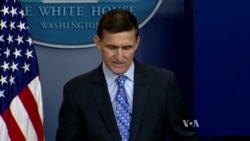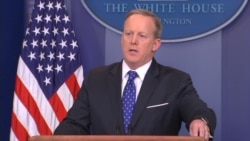The White House is defending the length of time it took President Donald Trump to decide to fire his first national security adviser, 18 days after he was warned that retired Army Lieutenant General Michael Flynn had been lying to Vice President Mike Pence about his contacts with Russia's U.S. ambassador.
Trump spokesman Sean Spicer said Tuesday that acting Attorney General Sally Yates, a holdover from former President Barack Obama's administration, gave Trump's White House lawyer "a heads-up" about Flynn's discussions with Ambassador Sergey Kislyak in late January, in the first week after Trump took office.
But Spicer said it took days to review her contention that Flynn had been "compromised" by his misrepresentations to Pence, possibly leaving himself open to blackmail from the Russians.
Trump fired Flynn in February, after Flynn had been in the national security post just 24 days. The president said it was unacceptable to him that Flynn had misled Pence, who told national television interviewers, based on discussions with Flynn, that Flynn did not talk with Kislyak about sanctions imposed by Obama against Russia for its meddling in last year's U.S. presidential election. Yates learned of Flynn's conversations through routine U.S. intercepts of Kislyak's calls.
WATCH: Trump White House was Repeatedly Warned About Flynn Before Dismissal
Political consideration
Spicer said the Trump administration could not immediately accept Yates' conclusions about Flynn, viewing her as a "political opponent of the president." Trump fired her days later after she refused to defend his first attempt at imposing a travel ban on people traveling to the U.S. from seven majority Muslim countries where terrorist attacks had occurred, an executive order that courts subsequently blocked.
WATCH: Spicer Explains Time Frame for Flynn Dismissal
"The process worked," Spicer said of the Flynn review. "We did what we were supposed to do. The decision we made [to fire Flynn] was the right one and we stand by it."
WATCH: Spicer: 'We're Not Going to Relitigate the Past' on Flynn's Dismissal
He declined to outline behind-the-scenes White House considerations leading up to Flynn's firing, saying, "We're not going to relitigate the past. We've moved on."
Reporters sharply questioned Spicer a day after Yates told a Senate panel about her contacts with the White House during the brief period she was the country's top law enforcement official.
Incorrect statements
Yates testified that she was concerned about repeated statements from Pence and other administration officials incorrectly stating that Flynn had not been in touch with Kislyak, when the intercepts showed the two men had spoken.
"The vice president and others were entitled to know that the information that they were conveying to the American people wasn't true," Yates said. "The Russians also knew about what General Flynn had done, and the Russians also knew that General Flynn had misled the vice president."
She added, "Every time that happened, it increased the compromise, and to state the obvious, you don't want your national security adviser compromised with the Russians."
Monday's testimony came as part of a Senate investigation into Russian meddling in last year's U.S. presidential election, which Trump won over former Secretary of State Hillary Clinton. Trump has dismissed the probe, as well as separate investigations by the FBI and the House of Representatives, as attempts by Democrats to find a reason for Clinton's upset loss.
The president used Twitter to blame the Obama administration for providing "the highest security clearance" for Flynn when he served as chief of the Defense Intelligence Agency, from which Obama fired him for his disruptive management style. When they met at the White House two days after Trump won the election, Obama warned Trump against hiring Flynn as national security adviser, but the new president didn't heed the advice.
No 'fan' of Flynn
Spicer said Monday that it was no secret Obama "wasn't exactly a fan" of Flynn, and the White House spokesman questioned why Flynn was not stripped of his security clearance.
"Why did the Obama administration let Flynn go to Russia for a paid speaking engagement and receive a fee?" Spicer said. "There were steps that they could have taken that — if that was truly a concern."
Flynn was paid more than $30,000 for a Moscow trip in 2015, where he sat next to Russian President Vladimir Putin at a dinner celebrating the 10th anniversary of the Kremlin-sponsored RT television network, formerly known as Russia Today, and also more than $500,000 to represent Turkey. Both payments came after he was warned to not accept money from foreign government after retiring from the U.S. military.










